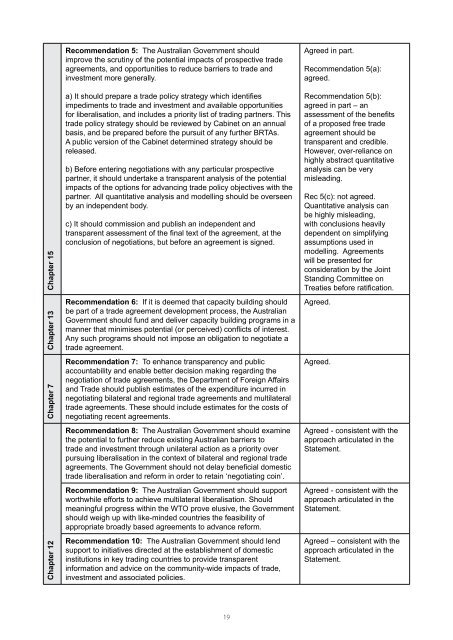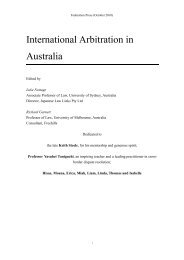Gillard Government Trade Policy Statement - Australian Industry Group
Gillard Government Trade Policy Statement - Australian Industry Group
Gillard Government Trade Policy Statement - Australian Industry Group
Create successful ePaper yourself
Turn your PDF publications into a flip-book with our unique Google optimized e-Paper software.
Recommendation 5: The <strong>Australian</strong> <strong>Government</strong> shouldimprove the scrutiny of the potential impacts of prospective tradeagreements, and opportunities to reduce barriers to trade andinvestment more generally.Agreed in part.Recommendation 5(a):agreed.Chapter 12Chapter 7 Chapter 13 Chapter 15a) It should prepare a trade policy strategy which identifiesimpediments to trade and investment and available opportunitiesfor liberalisation, and includes a priority list of trading partners. Thistrade policy strategy should be reviewed by Cabinet on an annualbasis, and be prepared before the pursuit of any further BRTAs.A public version of the Cabinet determined strategy should bereleased.b) Before entering negotiations with any particular prospectivepartner, it should undertake a transparent analysis of the potentialimpacts of the options for advancing trade policy objectives with thepartner. All quantitative analysis and modelling should be overseenby an independent body.c) It should commission and publish an independent andtransparent assessment of the final text of the agreement, at theconclusion of negotiations, but before an agreement is signed.Recommendation 6: If it is deemed that capacity building shouldbe part of a trade agreement development process, the <strong>Australian</strong><strong>Government</strong> should fund and deliver capacity building programs in amanner that minimises potential (or perceived) conflicts of interest.Any such programs should not impose an obligation to negotiate atrade agreement.Recommendation 7: To enhance transparency and publicaccountability and enable better decision making regarding thenegotiation of trade agreements, the Department of Foreign Affairsand <strong>Trade</strong> should publish estimates of the expenditure incurred innegotiating bilateral and regional trade agreements and multilateraltrade agreements. These should include estimates for the costs ofnegotiating recent agreements.Recommendation 8: The <strong>Australian</strong> <strong>Government</strong> should examinethe potential to further reduce existing <strong>Australian</strong> barriers totrade and investment through unilateral action as a priority overpursuing liberalisation in the context of bilateral and regional tradeagreements. The <strong>Government</strong> should not delay beneficial domestictrade liberalisation and reform in order to retain ‘negotiating coin’.Recommendation 9: The <strong>Australian</strong> <strong>Government</strong> should supportworthwhile efforts to achieve multilateral liberalisation. Shouldmeaningful progress within the WTO prove elusive, the <strong>Government</strong>should weigh up with like-minded countries the feasibility ofappropriate broadly based agreements to advance reform.Recommendation 10: The <strong>Australian</strong> <strong>Government</strong> should lendsupport to initiatives directed at the establishment of domesticinstitutions in key trading countries to provide transparentinformation and advice on the community-wide impacts of trade,investment and associated policies.Recommendation 5(b):agreed in part – anassessment of the benefitsof a proposed free tradeagreement should betransparent and credible.However, over-reliance onhighly abstract quantitativeanalysis can be verymisleading.Rec 5(c): not agreed.Quantitative analysis canbe highly misleading,with conclusions heavilydependent on simplifyingassumptions used inmodelling. Agreementswill be presented forconsideration by the JointStanding Committee onTreaties before ratification.Agreed.Agreed.Agreed - consistent with theapproach articulated in the<strong>Statement</strong>.Agreed - consistent with theapproach articulated in the<strong>Statement</strong>.Agreed – consistent with theapproach articulated in the<strong>Statement</strong>.19



